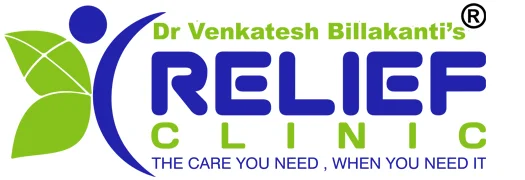What to Eat and Avoid to maintain good health ?
- relief-clinic
- October 28, 2023

When it comes to healthy diet, proper nutrition plays a crucial role in supporting the body’s immune system and aiding in recovery from day to day wear and tear. This article will discuss the foods to eat and avoid to keep your body fit and healthy.
Foods To Eat to maintain good health
When it comes to healthy diet, proper nutrition plays a crucial role in supporting the body’s immune system and aiding in recovery from day to day wear and tear. This article will discuss the foods to eat and avoid to keep your body fit and healthy.
1. Hydration is key: Staying hydrated is important as it helps maintain the body’s fluid balance. Drink plenty of water, coconut water, and clear soups to prevent dehydration.
2. Opt for nutritious fruits: Fruits rich in vitamin C, such as oranges, strawberries, papaya, kiwi, and guava, can help boost immunity and promote healing. These fruits also provide essential antioxidants that combat free radicals in the body.
3. Include vegetables in your diet: Vegetables like spinach, broccoli, kale, carrots, and bell peppers are packed with vitamins and minerals that strengthen the immune system. They also contain fiber, which aids digestion.
4. Consume protein-rich foods: Incorporate lean protein sources like chicken breast, fish (salmon or tuna), eggs, tofu or legumes into your meals. Protein supports tissue repair and helps build antibodies needed for fighting infections.
5. Whole grains for energy: Choose whole grain options like brown rice, quinoa or whole wheat bread over refined grains as they release sustained energy without causing blood sugar spikes.
6. Healthy fats are beneficial: Include healthy fats such as avocados, nuts (almonds or walnuts), seeds (flaxseeds or chia seeds), and olive oil in your diet. These fats support brain function and help reduce inflammation.
7. Include immunity-boosting foods: Consume foods rich in vitamin C, such as citrus fruits (oranges, lemons), strawberries, kiwi, bell peppers, and leafy greens. These foods help strengthen the immune system.
8. Choose easily digestible foods.
Foods to avoid to maintain good health
1. Avoid processed foods: Processed snacks like chips or cookies should be avoided as they often contain unhealthy trans fats that can lead to inflammation.
2. Reduce sugary foods/beverages: High sugar intake can weaken the immune system. Avoid sugary drinks, candies, and desserts.
3. Limit caffeine and alcohol: Both caffeine and alcohol can dehydrate the body.
4. Avoid fatty or fried foods: These types of food can be harder for the body to digest during stress and may cause discomfort or worsen symptoms such as nausea or vomiting.
Remember, this article provides general guidelines on what to eat and avoid. For personalized advice, it is always recommended to consult a healthcare professional.
Dr. Venkatesh Billakanti is an experienced general physician who works at Relief Clinic in Manikonda and Yashoda Hospital in Hitech City.




